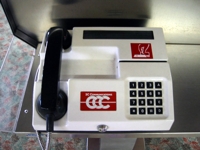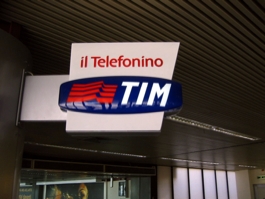Hmm. At the airport, the first things I saw were a TIM network and a CCC phone. Funny.
Archiv für den Monat: Juni 2003
Hackmeeting: I18N
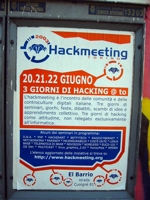 One of the main problems for me here is the language. I don‘t speak italian. Just a bit spanish but it is impossible to make this work for me here in any way. Well, almost everybody speaks english here so it is not a general problem but of course most of the chatting and the talks in the next days will be in italian as well.
One of the main problems for me here is the language. I don‘t speak italian. Just a bit spanish but it is impossible to make this work for me here in any way. Well, almost everybody speaks english here so it is not a general problem but of course most of the chatting and the talks in the next days will be in italian as well.
Well, I do not complain. Hackmeeting is a local event. Like the Congress used to be for a long time. We are trying hard to make the Congress a bit more international and we have already succeeded a bit. But there is still a long way to go. However, the Camp on the other hand will be mainly in english.
But Hackmeeting excels in other ways: it moved from town to town each year. So it is forced to adapt every time which is probably a good thing. But to get Europe‘s hackers together, some kind of regular international meeting has to be established. Maybe the Congress can fill this niche, maybe not. We should try anyway.
Europe is still divided – not in old and new – but by language, electrical plugs, alternating mindsets and totally different national political situations (see Lex Berlusconi). But I believe the Internet and other media slowly and ever faster brings us together.
Post Scriptum: Did you know what „I18N“, the general terms for internationalization issues, actually stands for? It is so simple: I + 18 letters + N.
Hackmeeting: Il DHCP umano é in
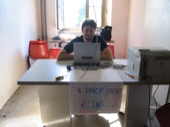 After a five hour flight (there is no direct connection between Berlin and Torino) I finally arrived at the Hackmeeting place called „El Barrio“. The event actually starts tomorrow so there are just a couple of people so far.
After a five hour flight (there is no direct connection between Berlin and Torino) I finally arrived at the Hackmeeting place called „El Barrio“. The event actually starts tomorrow so there are just a couple of people so far.
The event is really cool: entrance is free (although you are free to pay any kind of donation of course). For the first time, Hackmeeting is not taking place at a squatted place but in a former school that is usually empty. Doesn‘t look as if the administration has any plans for this place in the near future.
However, everything reminds of the good old days of the Chaos Communication Congress at Eidelstedter Bürgerhaus in Hamburg. Cables are running from room to room, old computers fill the tables and the general atmosphere is relaxed and freaky.
On the first floor, you are welcomed by the „human DHCP server“ which will hand out a IP address to you on request. I didn‘t request one. I hacked my way to the server room and attached my AirPort Base Station to the router giving me wireless access to the net. Internet access is a shaped 2 MBit/s connection. Performance is ok. Although the final router is doing NAT and is out of control of the admins. So no Remote Desktop administration for me unless I set up a tunnel. At least I‘ve got something to hack for tomorrow :-)
Leaving Berlin
On the plane again. I have left Berlin with an Airbus 320-200 of Alitalia. Pushing away news of a bomb being found on board of one of Alitalia‘s flights recently I try to do something useful with my „air time“.
I grab one of the „Herald Tribunes“. Actually I grabbed three of them. Probably because I am used to being handed over a three-kilogram edition of Frankfurter Allgemeine on other flights and I forget that international US magazines and newspapers are usually not that thick because there is nothing to report on the world because nothing happens. At least nothing happens that you could explain to Americans that‘s easy to swallow.
The Tribune presents the usual stuff: photos of US soldiers in Iraq accompanied by happy children, US soldiers in Iraq taking away guns from civilians, US presidents claiming that the weapons of mass destruction will be found sooner or later. Hmm. The USA dropped so many cluster bombs and mines on that country, why don‘t they just take of them?
The cabin crew tells us there is a „problem with the catering“. What they mean is: there is no catering. Instead they serve disgusting coffee and tasteless crackers. The crew actually looks more swedish to me: they are all blond. But once they open their mouths it is clear they are not. It is difficult to tell if they are talking in italian or in english to you. It boths sound more or less the same.
So I turn to my computer and watch my battery drain faster than speed of light. When it awoke it showed 86%. I am sure it was fully charged when I left. My PowerBook G4 is two years old. And it shows: the PC-Card slot stopped working long time ago, the power connector has a Wackelkontakt, two pixel columns on the screen produce a fancy blue vertical line and the overall look of the machine can only be classified as „used“. I like the „used“ style, but I would be much happier if Apple would start asking people like me what their computers should be made like. 76%.
I mean, you usually pay around 3000 to 4000 EUR for such a machine, depending on configuration. Quite a lot of cash. And if you drop it on the floor, it‘s kaputt. Funny, eh? Why can‘t these machines be rugged at the first hand? But no: they bend, they scratch, screws fall out of it and so on. The life cycle of a laptop is two years, not more. This has to change. But WWDC looms, „rumour“ has it there might be a new PowerBook as well. My sources tell me that there will be a new PowerMac for sure but it is still unclear if there will be a new laptop. 66%.
Landed in Rome. It‘s hot when I enter the bus and I am happy to be back in air-conditioned realms again. I proceed to the transfer zone. Another bag check. My co-travellers are still too dumb to know that they have to take their metal stuff off before going throught the detector. However, the transfer zone is boring. Lots of shops, I choose the pizza place, I mean: this is Italy, isn‘t it?
It isn‘t. The pizza is just yet another junk product. But at least it tastes totally different from what I am used to in Germany. All the products are described in italian only. I don‘t care. I open my PowerBook: no wireless network available. Sigh. I was told there will be Internet in Torino airport. We‘ll see.
I bump into a „Telecom Italia“ lounge-style area. It has six Windows terminals and some nice red couches with plugs for power, Ethernet and head phones (3,5mm so that standard computer headphones don‘t fit, oh my). And: there is a wireless network as well. But logging in is prohibited: the router blocks me because – as the helpless girls at the info counter put it – I am not a Telecom Italia customer. Why are they so stupid everywhere? Is it so complicated to just switch Internet ON at airports? I mean, they provide water and electricity for free. Why no Internet access? I don‘t get it. 46%.
However. My next flight is waiting. Bringing me to Torino (or should I call it Turin? No, I stick to the original name as I would do with any german city as well). No food on this flight at all. Just some dry biscuits and a bit of orange juice. I keep on reading until everything is over. Touchdown in Torino. There will be Olypmpics here in 2006. How interesting. My friends are late. I sit down and try to get Internet: nada. Again. I want to be in Helsinki now :-)
Cybersonica Festival in London
 Cybersonica Festival is taking place in London starting tomorrow. It is basically about electronic music and video art but in contrast to Barcelona‘s Sonar festival it also features symposiums, workshops and presentations in addition to the usual live performances and dance parties.
Cybersonica Festival is taking place in London starting tomorrow. It is basically about electronic music and video art but in contrast to Barcelona‘s Sonar festival it also features symposiums, workshops and presentations in addition to the usual live performances and dance parties.
Falk Gärtner – better known as proto.beamaz:fAlk – will have his apperance there as well. If you are in London, go check it out. He is the one who was contributing the visuals to our Blinkenlights videos and was playing live on the Bibliothèque nationale de France during our Arcade project.
If you live in London, go check out his work.
Knocking with the digital broomstick
You probably know that feeling: there is a party going on and the music is loud, the guests are shouting and maybe they are even pissing in your stairway. You need to bring the word out to regain your peace. You take out your broomstick and start knocking on the ceiling. This method worked for quite a long time.
In these digital days, new annoyances have come up. Your own web site has somehow joined your private space and when people start to beleaguer your digital infrastructure it‘s getting really complicated as your neighbour is no longer next door but can be basically everywhere on this planet.
Long time blogger Mark Pilgrim just had this problem. Somebody was sucking files like mad, causing load and cost showing a very rude form of misbehaviour. Time to take action. But what can he do?
He chose to publish all the information available about the suspect wielding the only broomstick available to him. What will happen next? He could care. Or he couldn‘t. Well, maybe it works. Maybe it doesn‘t and people start calling for new laws to be enforced or whatever.
We still have to develop our global digital social system.
Admire 8-Bit Nudity!
The Girls of 64 are preserving the sexy side of the Commodore 64. Do you really think you are
mature enough to enter this site? Then go ahead.
INPUT 64 archives
 Like so many, I started programming on a Commodore 64. This was an affordable, simple computer with cool graphics and – for that time – stunning sound (it had three independent synthesizer channels with programmable ADSR waveforms). I think I laid my hands on one in 1983 first and I bought my own machine in 1984.
Like so many, I started programming on a Commodore 64. This was an affordable, simple computer with cool graphics and – for that time – stunning sound (it had three independent synthesizer channels with programmable ADSR waveforms). I think I laid my hands on one in 1983 first and I bought my own machine in 1984.
The C64 made me a programmer. Although quite a lot of games were available for that machine, gaming didn‘t interest me that much (and this is still so). After having read Rodney Zaks‘s „Programming the 6502“ book I dived into the machine and I soon became quite capable with that little monster.
Back then, a group of journalists at Heise Verlag (now famous for c‘t magazine and the daily Heise Newsticker) started a cool project, called INPUT 64. It was actually a magazine on tape: the first interactive computer magazine ever and that way somehow a predecessor of the web today. All the software came on Tape (!) accompanied by a small booklet. INPUT 64 took off in 1985, changed to Floppy Disk in 1986 and lived until 1988.
As I lived in Hannover back then, I became aware of the project pretty soon and eventually became one of the programmers who contributed to the magazine‘s content. The staff chose my program DISC MON 1541 to be the program of the month. I was proud. And it was actually a quite useful program: you could interactively browse and change the memory of the peripheral disk drive in a pretty intuitive way.
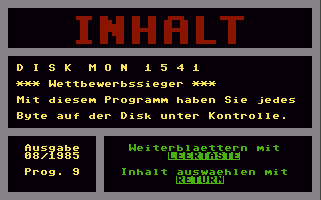 Imagine my joy when I bumped into an archive of the INPUT 64 magazine today. And there it was: the disk image of the 08/1985 edition was there and contained the lost piece of software (you can run it using a C64 emulator like Frodo or Power64). Furthermore, me and my two programming buddies created the new introductory sequence that was included since 10/1986. And it is all on the web. The web is so cool.
Imagine my joy when I bumped into an archive of the INPUT 64 magazine today. And there it was: the disk image of the 08/1985 edition was there and contained the lost piece of software (you can run it using a C64 emulator like Frodo or Power64). Furthermore, me and my two programming buddies created the new introductory sequence that was included since 10/1986. And it is all on the web. The web is so cool.
Finally we contributed in another and final way: getting bored of the C64, we all turned to UNIX back then and we heavily evangelized UNIX in our neighbourhood. The editorial staff of INPUT 64 became addicted to UNIX as well and in the end INPUT 64 went away and the staff moved over to their next magazine: iX, a UNIX magazine, which still exists.
Catching up with history
I didn‘t update my home page for a couple of years now. So I took a closer look and to my dismay, the HTML was old and ugly, the links were worn out and it didn‘t tell the whole story anyway.
So I spent some time updating both content and the underlying code. Now the web knows a bit more about me and the code complies to current XHTML and CSS standards. I guess this will make me sleep better now.
Students for an Orwellian Society
Because 2003 is 19 years too late!
War Is Peace. Freedom Is Slavery. Ignorance Is Strength. It seems, the only way to fight the idiotism out there is sarcasm. I agree.

